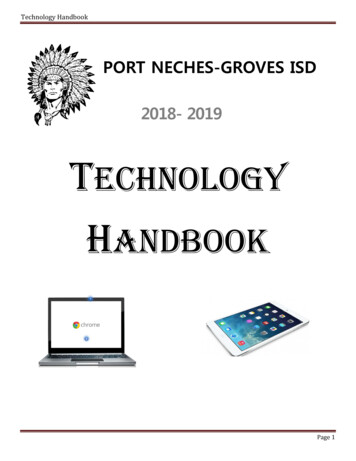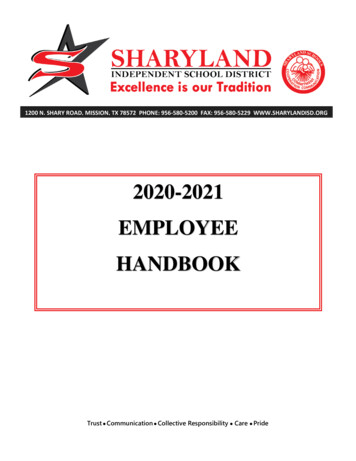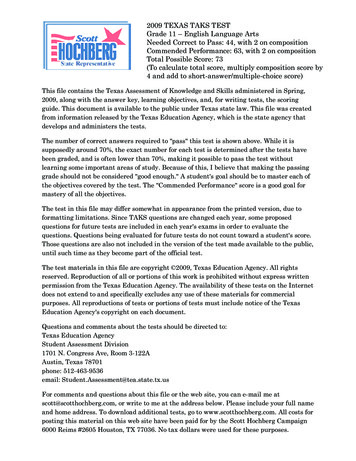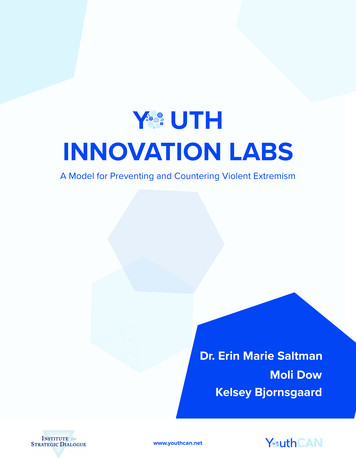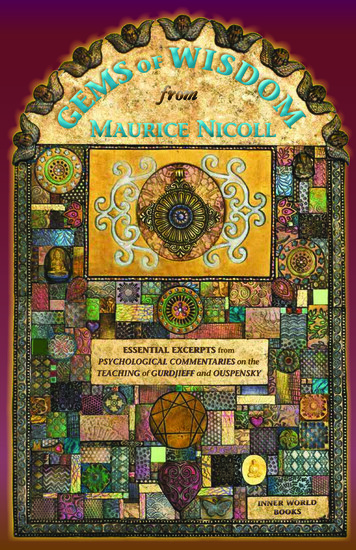
Transcription
WI SDSM fromOMGEOFMAURICE NICOLLESSENTIAL EXCERPTS fromPSYCHOLOGICAL COMMENTARIES on theTEACHING of GURDJIEFF and OUSPENSKYINNER WORLDBOOKS
Essential Excerpts fromPSYCHOLOGICAL COMMENTARIESON THE TEACHING OFGURDJIEFF AND OUSPENSKYINNER WORLD BOOKS
Edited by Chuck SherOriginal source - Maurice Nicoll’s 5-volume set (plus index)“Psychological Commentaries on the Teaching of Gurdjieff and Ouspensky,”Excerpts used by permission of Eureka Editions, www.eurekaeditions.comCover artwork by Sueann Bettison-Sher, ChinaMosaics.comCover graphics by Linda McLaughlin, Santa RosaBook design, formatting by Attila Nagy(Back cover quote from J. & D. Howarth’s “It’s Up To Ourselves,” p. 303)Copyright 2015 Inner World Books, P.O.Box 445, Petaluma, CA 94953inner-world-books.comshermuse@sonic.netISBN 978-0-9910773-1-1All Rights Reserved.
TABLE OF CONTENTSPreface . . . . . . . . . . . . . . . . . . . . . . . . . . . . . . . . . . . . . . . . . . . . . . . iiSection I - tHE CORE PERSPECTIVE OF THE WORKChapter 1 - Overview . . . . . . . . . . . . . . . . . . . . . . . . . . . . . . . . . . . . 1Chapter 2 - Internal Separation, Multiple ‘I’s . . . . . . . . . . . . . . . . . . 7Chapter 3 - Self-Observation . . . . . . . . . . . . . . . . . . . . . . . . . . . . . 13Chapter 4 - Self-Remembering . . . . . . . . . . . . . . . . . . . . . . . . . . . . 18Chapter 5 - Taking in Impressions . . . . . . . . . . . . . . . . . . . . . . . . . 24Chapter 6 - Will and Work Aims . . . . . . . . . . . . . . . . . . . . . . . . . . 27Chapter 7 - Practicing Work Aims . . . . . . . . . . . . . . . . . . . . . . . . . 33Section II - WORKING WITH THE WAY THINGS AREChapter 8 - Recognizing Our Inner States . . . . . . . . . . . . . . . . . . . 39Chapter 9 - Working with Our Normal State of Being . . . . . . . . . . 42Chapter 10 - False Personality . . . . . . . . . . . . . . . . . . . . . . . . . . . . 51Chapter 11 - Work on the Intellectual Centre. . . . . . . . . . . . . . . . . 55Chapter 12 - Work on the Moving Centre . . . . . . . . . . . . . . . . . . . 58Chapter 13 - Work on the Emotional Centre . . . . . . . . . . . . . . . . . 60Chapter 14 - Seeing Self-Love at Work . . . . . . . . . . . . . . . . . . . . . . 69Chapter 15 - Non-Identifying . . . . . . . . . . . . . . . . . . . . . . . . . . . . 74Chapter 16 - Internal and External Considering . . . . . . . . . . . . . . . 78Chapter 17 - Interpersonal Relations . . . . . . . . . . . . . . . . . . . . . . . 85Section III - DEVELOPING OUR BEINGChapter 18 - Levels of Being . . . . . . . . . . . . . . . . . . . . . . . . . . . . . 88Chapter 19 - Intentional Suffering . . . . . . . . . . . . . . . . . . . . . . . . . 92Chapter 20 - The Nature and Stages of Work. . . . . . . . . . . . . . . . . 94Chapter 21 - Escaping from the Law of the Pendulum . . . . . . . . . 105Chapter 22 - Seeing the Law of Three. . . . . . . . . . . . . . . . . . . . . . 108Chapter 23 - A New Concept of Time . . . . . . . . . . . . . . . . . . . . . 111Chapter 24 - Thoughts on The Cosmology of the Work . . . . . . . . 113Chapter 25 - Rebirth . . . . . . . . . . . . . . . . . . . . . . . . . . . . . . . . . . 117Chapter 26 - Miscellaneous Excerpts . . . . . . . . . . . . . . . . . . . . . . 119
PREFACE“Man’s possibilities are very great. You cannot evenconceive a shadow of what man is capable of attaining.But nothing can be attained in sleep. In the consciousness of a sleeping man his illusions, his ‘dreams’, aremixed with reality. He lives in a subjective world andhe can never escape from it. And this is the reason whyhe can never make use of all the powers he possessesand why he lives in only a small part of himself.”– G. I. GurdjieffGeorge Gurdjieff brought to the West a teaching unlike anything seenor heard of in the modern world--a profound and revolutionary understanding of man’s inner psychology uniquely linked to a cosmologydescribing his place in the universe.Gurdjieff insisted that these ideas, which he told us have existed in oneform or another since ancient times, are not merely to be the subject ofphilosophical speculation, but that a man must verify for himself thetruth about himself with specific practical inner work—a work designedto assist a man in awakening from his inner sleep.Such a practical study of ourselves along these lines is today referencedas the ‘Gurdjieff Work’ and Gurdjieff urges us to begin our inner journey with an examination of the very state in which we find ourselves our present psychological condition.This collection of excerpts from Dr. Nicoll’s five-volume PsychologicalCommentaries presents the essence of Dr. Nicoll’s personal experience ofthe Gurdjieff teaching. Following each excerpt is the volumenumber and the page number that it was taken from.Dr. Maurice Nicoll (1884-1953) was a British physician, specializing inpsychological medicine. He was a student and close colleague of C.G.Jung when he met P.D. Ouspensky in 1921 and became interested inii
the teachings of G.I. Gurdjieff. He and his wife lived and worked atGurdjieff’s extraordinary Institute for the Harmonious Development of Manin Fontainebleau, France for a year. He then returned to London wherehe continued to study with Ouspensky, and later to organize his owngroups. Dr. Nicoll and his wife Catherine were close friends of Mr. Ouspensky’s for many years.Dr. Nicoll is also the author of Living Time, The Mark, and The NewMan: An Interpretation of Some Parables and Miracles of Christ.Psychological Commentaries on the Teaching of Gurdjieff and Ouspensky waswritten for—and read to—the members of his study groups from 1941until shortly before his death in 1953. This epic, five-volume work(plus a new index) is available from the publisher, Eureka Editions, ontheir website, www.eurekaeditions.com or on Amazon.com websites.Although almost all of the words and phrases referenced in this bookare non-technical, nevertheless their full meaning emerges only as partof the process of an individual’s inner work. An unsurpassed introductory description of the Gurdjieff Work can be found in P. D. Ouspensky’sIn Search of the Miraculous: Fragments of an Unknown Teaching.iii
SECTION IThe Core Perspectiveof the WorkCHAPTER 1 - OVERVIEW‘A HIGHER LEVEL OF BEING’“A higher level of being lies immediately above all of us at this verymoment. It does not lie in the future of time but in ourselves at thisvery moment, now . . . The work is about a certain transformation ofthe instant, of the moment, of the present.” V. 1, p. 2THE MYSTERY OF EXISTENCE“People take this mystery of their own existence and the Universe forgranted. It is only when one begins to feel and ponder this mysterythat it becomes possible to awaken from sleep. This capacity is calledMagnetic Centre.” V. 4, p. 1255TWO REALITIES“We stand between two realities, one given by the senses and theother given by our relationship to Higher Centres. One is externaland the other is internal and, I would add, eternal. It has often beensaid that this Work is to prepare the lower centres for the reception ofHigher Centres.” V. 4, p. 1322LIFE AS WORK“If a man begins to take life as work, then his whole relationship toexistence begins to change, because the meaning of life changes forhim. He sees life in another light, not as an end, but as a means, andthis enables him not to identify with life and its happenings, as heformerly did.” V. 1, p. 66RADICAL ACCEPTANCE OF LIFE“Everything that happens to one in life is the best thing that couldhappen to one, if one takes it as work—as a means of development.1
You realize in a practical way how you are created a self-developingorganism. You no longer take life as an end in itself or expect it to beas you wished, but you take it as a means to an end.” V. 3, p. 863INNER DEVELOPMENT“A seed must be planted to develop, and have the right food, air andlight. So it is with us, if we become planted in the ground of esotericteaching. This is not a fanciful idea. It is not an idealistic idea. It isnot a pious idea. It is not a sentimental idea. It is a fact. Given theright conditions, a man, a woman, can begin to undergo what he andwhat she were originally created for. We were not created merely tolive in life.” V. 2, p. 680CONSCIOUSNESS“What is the most precious, the most mysterious, and the most indefinable possession we have been given? The answer is—Consciousness.We are given a little of this indescribable and unfathomable mystery.But, as we are, in a state of hypnotic sleep, we do not use this gift,but, as it were, surrender it to every pleasing mood, every passingthought.” V. 3, p. 1163LACK OF CONSCIOUSNESS“In assembling the different parts of the Work to form an instrumentin the mind for the reception of the finer vibrations continually coming from the two Higher Centres that are present in Man, the ideathat we are not properly conscious is one of the main supporting partsof the framework . . . But unless it becomes a truth of experience itcannot take its necessary place in the instrument.” V. 5, p. 1522WHAT IS YOUR TASK?“People live and die, just the same, not seeing their task . . . namely,to work against their daily mechanicalness and awaken from themselves.” V. 3, p. 1190WHAT IS YOUR TASK? II“What is your task? Why are you down here? What is it that youhave to change? What is it that you have to learn about yourself, this2
thing you take for granted, this thing that is your apparatus for living? Does your apparatus for living give you the results you wish for?Yourself, your personality, is the apparatus you are using for livinglife This is the thing we wheel out every morning to face the daywith. And this is the thing the Work speaks of in all its stages—thething you can work upon and alter. Try to think that it is not life youcan change, but yourself in your reaction to life.” V. 1, p. 139INNER DEVELOPMENT II“You cannot alter yourself directly. You can only alter by means ofcertain kinds of effort. These efforts are shown us. There is the greateffort of non-identifying—not identifying with yourself, to beginwith. (What a fine fellow I am!) There is the great effort of SelfRemembering . . . There is the great effort of self-observation . . .All this increases consciousness. Things alter by your becoming moreconscious, more aware of them, by observation, by noticing withoutcriticism, by gradual separation from them.” V. 2, p. 681CLEANING THE MACHINE“The first stages of the Work are sometimes called ‘cleaning themachine.’ . . . The Work tells you more about what not to do thanabout what to do. Now people often ask: ‘What am I to do?’ On thatside the Work says only two definite things: ‘Remember yourself’ and‘Observe or notice yourself.’ That is what you must try to do. But onthe other side the Work says many things about what not to do. Itsays, for example, that you must try to struggle against being identified, try to struggle with mechanicalness, with mechanical and wrongtalking, with every kind of internal considering, with every kind ofself-justifying, with all the different pictures of yourself, with yourspecial forms of imagination, with mechanical disliking, with all varieties of your self-pity and self-esteem, with your jealousy, with yourhatreds, with your vanity, your inner falseness, with your lying, withyour self-conceit, with your attitudes, prejudices, and so on.”V. 1, pp. 160-13
ENLARGING CONSCIOUSNESS“The idea of this Work is to enlarge consciousness. We have, we aretold, to become far more conscious to ourselves through direct self-observation, so that all sorts of narrow pictures that we have of ourselvesare destroyed and we begin to live in a larger edition of ourselves. Wecan take it as a general rule in the Work that when we are up againstsomeone else we may be sure that that is the very thing we have towork on in ourselves. This gives us an entirely different orientation andin my opinion it is the beginning of real work.” V. 3, p. 831LIFE AS TEACHER“We have to practice non-identifying in the midst of the happeningsof life; we have to practice self-remembering in the midst of affairs;and we have to notice and separate ourselves from our negative emotions in the midst of all hurts and smarts in daily life.” V.1, p. 14‘NEVER FORGET THE WORK’“A man must never forget what he is doing in the Work. He must, asG. once said, reach a state such that, in whatever direction he is twisted and turned, however badly he is treated, he never forgets the Work,and never acts save through the medium of the Work.” V. 1, p. 226INNER STABILITY“Other feelings of oneself are possible that are not derived from lifeand personality, and these feelings give a man a sense of stability thatnothing outside him can take away. And it is from these feelings thata man begins to feel himself free, because they depend on nothingoutside him Personality, roughly speaking, lives by comparison withothers Real ‘I’ does not exist through comparison.” V. 1, pp. 274-5INNER STABILITY II“We have to make something very strong in ourselves by the help ofthe Work little by little so that we can withstand the shifting scene,moments of happiness followed by moments of depression, momentsof hope followed by moments of despair, in order that we may have acentre of gravity within ourselves . . . a certain point of consciousnessthat is invulnerable. This is the beginning of the birth of Real I in4
you which is not influenced by outer circumstances. One then worksthe other way round—that is, the machine formerly driven by outerevents is now worked from within—from what is higher than life.”V. 4, p. 1343WEAKENING THE HOLD OF PERSONALITY“Now the realization of one’s mechanicalness and the realization ofone’s ignorance—for all knowledge leads into mystery—are necessaryfor any transformation of oneself to take place. Why? Because theyweaken the hold of the acquired Personality.” V. 3, p. 1051ADDING VERSUS TAKING AWAY“The first step in the Work is to begin to free oneself from one
Dr. Maurice Nicoll (1884-1953) was a British physician, specializing in psychological medicine. He was a student and close colleague of C.G. Jung when he met P.D. Ouspensky in 1921 and became interested in . iii the teachings of G.I. Gurdjieff. He and his wife lived and worked at Gurdjieff’s extraordinary Institute for the Harmonious Development of Man in Fontainebleau, France for a year. He .


